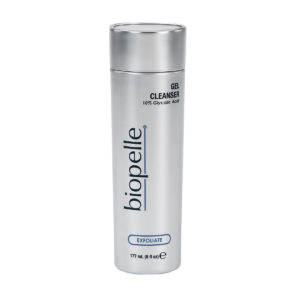Glowing, radiant-looking skin is a hallmark of good health. Though dull, scaly-looking skin can occur at any time, nearly anywhere on the body, and for any number of reasons.
You probably already know some of the common culprits — using harsh skincare ingredients — or none at all — not drinking enough water, and too much sun or wind exposure. Even genetics can come into play. Less commonly, certain medications and illnesses, such as hypothyroidism, may be to blame for your dry, dull-looking skin.
Exfoliation is the process of removing excess dead skin buildup to reveal the fresher-looking skin below. Done correctly, it’s a quick-fix solution that can help restore the look of youthful, glowing radiance. Done wrong though — exfoliating too often, too harshly or with the wrong products or tools — can have risks.
Learn about exfoliating, how it works, the right and wrong way to do it, how often you should exfoliate, and more.

Exfoliate Gel Cleanser
Different Methods of Sloughing Off Dead Skin Cells
The body naturally sloughs off dead cells, but when your skin becomes extra dry, dead skin cells can build up, and lead to dull-looking, rough skin texture. Extra layers of dead skin cells can also lead to increased pore clogging and acne.
Exfoliating can dramatically ramp up skin’s shedding process when done correctly with the right products. Mechanical and chemical methods are the most common DIY exfoliation methods, according to the American Academy of Dermatology Association. Let’s look at some of the options.
Scrubs
Scrubs may be plentiful in drug stores, have catchy label names, appealing scents and be relatively cheap to buy, but faces beware. Some can cause micro-tears in flesh — small wounds in the skin that can allow bacteria in.
The gritty ingredients commonly found in these products are often derived from not-so-friendly sources, including seashells, fruit stones such as peaches, sugar crystals and even volcanic rock fragments.
Gentle exfoliating cleansers with chemical exfoliation ingredients, such as glycolic acid, are a better option for removing dull, dead skin cells with less irritation.
Exfoliation Loofahs
Loofahs are a category of fibrous natural and synthetic materials that are typically used in combination with water to slough off dead skin. Loofahs are most commonly used on the body, though smaller loofah pads designed for the face are available.
A natural loofah is a rough, spongy material originating from the luffa plant flowers. Natural loofah is prone to becoming riddled with bacteria buildup, partly because of its open, spongy texture and partly because it can take a long time to dry. The bacteria that can collect in loofah, including E. coli, can easily transfer to your skin when you exfoliate, according to Healthline. Because natural loofah is abrasive, applying too much pressure when scrubbing or using one too often can also cause undue skin irritation.
Synthetic Loofahs or shower poufs made of netted nylon can help to remove dead skin cells, but they can also irritate your skin and exacerbate psoriasis if overused or abused, the AAD says. Using hot water, harsh soaps and cleansers, and not rinsing enough, can make matters worse, the academy says.
Gentle Chemical Exfoliation
Chemical exfoliants gently penetrate the outer skin layers to break down dead skin cells so they can be easily swept or washed away from the skin. Glycolic, lactic, salicylic and other acids can be combined with ingredients, such as taurine, that moisturize to help decrease irritation that can sometimes be experienced in chemical exfoliation methods. Chemical exfoliants can be formulated in cream and gel cleansers and leave-on products.
A quality chemical exfoliation skin care cream or gel cleanser can help remove dead skin cells and impurities, excess oil and makeup from the skin surface, leaving skin looking more radiant and glowing by helping to reveal the fresh skin beneath the surface.
Dermatologists often recommend chemical exfoliation over physical exfoliants like scrubs or cloths because they can slough off skin without causing physical damage.
Exfoliation Tips
AAD recommends these general tips for safer exfoliation:
- Notice your over-the-counter products – Some exfoliation products and medications may cause skin sensitivity or peeling, including products containing benzoyl peroxide, which is frequently used for acne. Exfoliating and using such products may worsen skin drying or exacerbate acne.
- Use a method that works with your type of skin –
- Prone to dryness, break outs, or easily becomes sensitive: Gently use a washcloth or a mild chemical exfoliator, such as skin care formulated by dermatologists, to gently slough away dulling, dead skin
- Prone to oiliness, thicker, resilient skin: Can possibly use stronger chemical treatments and other exfoliation methods
- Darker skin tones prone to dark spots after injury, including break outs: Best to avoid strong mechanical or chemical exfoliation methods
- Be gentle and kind to skin: Apply scrubs (if you insist on using them) and chemical exfoliators with your fingertips, using light touch in a circular motion for 30 seconds or less. Then, rinse with warm, not hot, water.
- Don’t exfoliate damaged skin: Injured skin, including open wounds, scratches, or sunburned skin should never be exfoliated.
- Moisturize after exfoliating: Apply a moisturizer suited to your skin type right after exfoliating. Use a dermatologist-approved moisturizing product that’s been formulated to work with your particular chemical exfoliant within a quality skin care line.
How Often Should You Exfoliate?
How often you exfoliate depends on the type of skin you have and the exfoliation method you’re using, says the AAD. If you don’t know your skin type, it can be a good idea to consult with a dermatologist for advice.
As a general guideline, aggressive exfoliation methods, such as loofahs and scrubs, should be used less frequently. Dermatologist-created skin care products containing chemicals used for gentle sloughing that are specially formulated for safe use are a better option.
Protect Your Skin’s Protective Barrier
Skin has a natural barrier that helps to protect against invasions from germs and other harmful elements such as allergens and bacteria. It also helps to seal moisture in our skin. It’s important to maintain the skin’s barrier to keep healthy and look your best, the AAD says.
Exfoliation is a great way to maintain the healthy-looking glow of youth by revealing your freshest skin. Using the wrong exfoliation method or using it incorrectly or too often can damage your skin’s barrier and create other skin problems.
Reveal Smoother, Glowing Skin With Biopelle Exfoliate
Biopelle is a dermatologist-formulated, award-winning skin care line that addresses many skin care concerns.
The Biopelle Exfoliate skin care collection contains key ingredients that are safe for sloughing away dead skins to reveal your youthful-looking skin. Discover the Biopelle Exfoliate collection for yourself.

